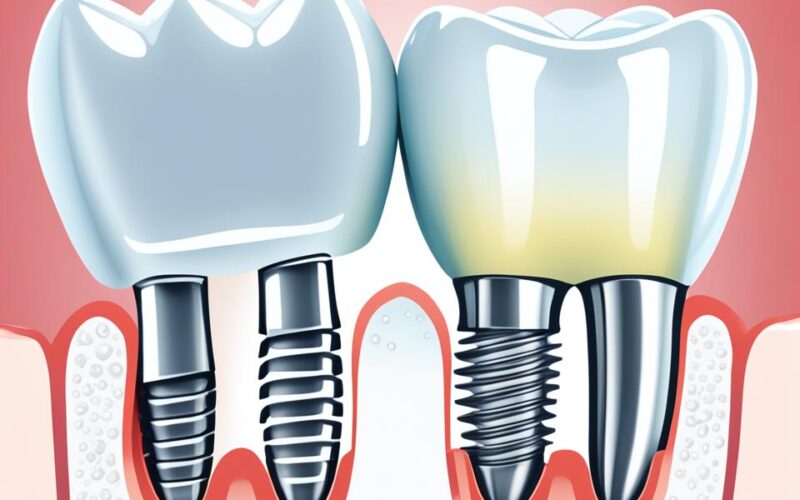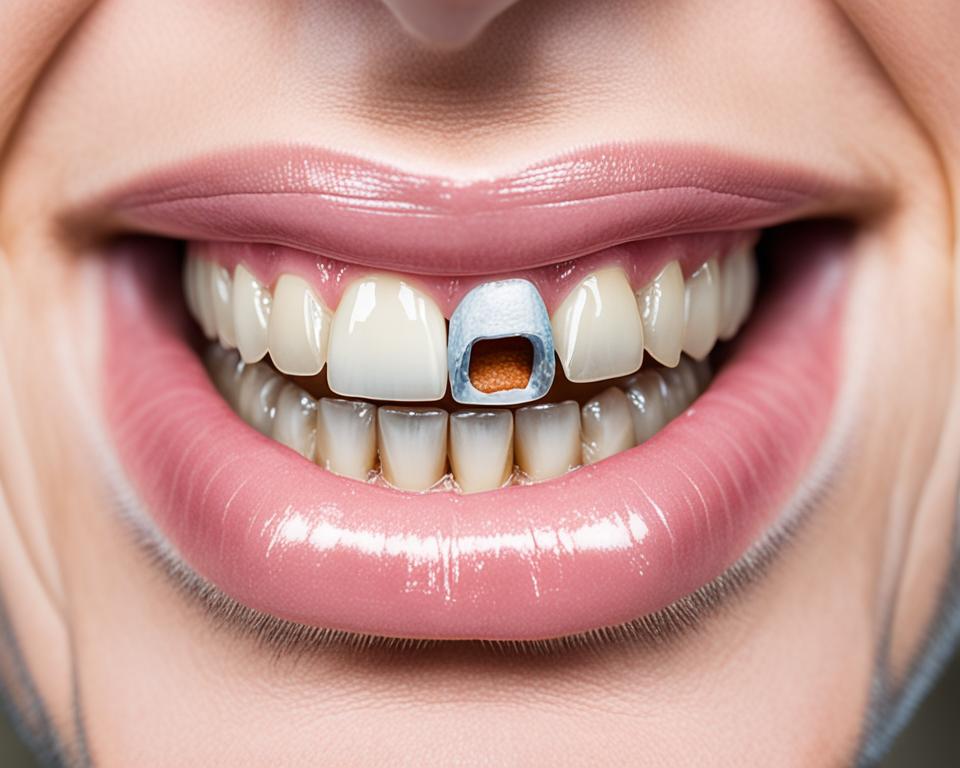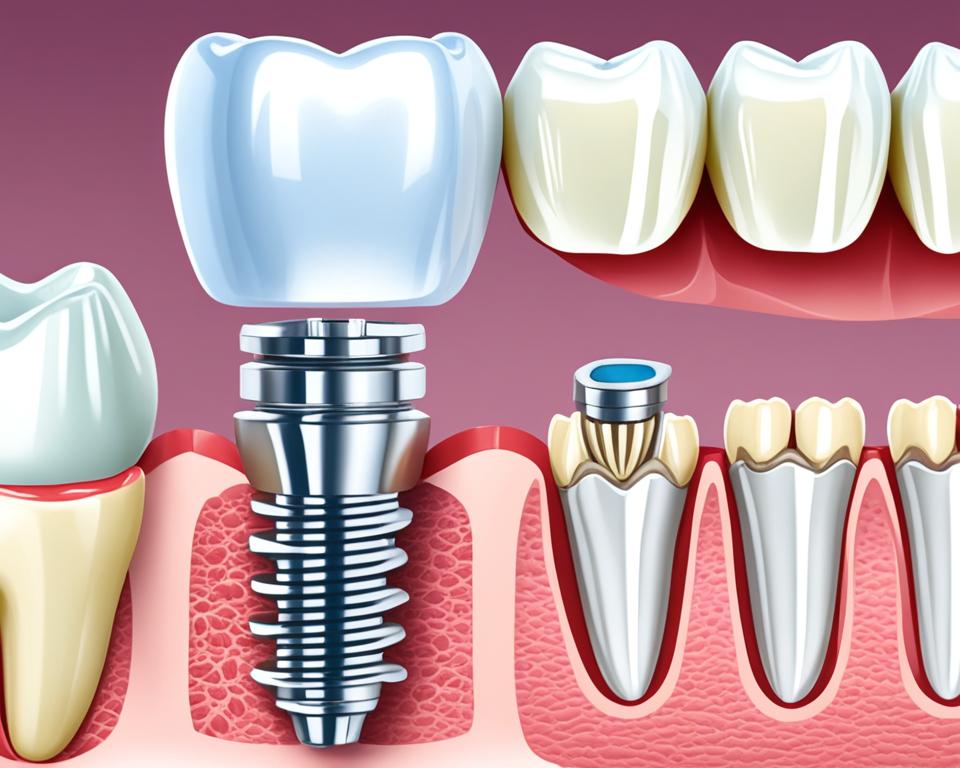Tooth loss is a prevalent issue, affecting a significant percentage of adults. Whether due to decay, injury, or gum disease, missing teeth can impact one’s confidence, oral health, and overall well-being. Fortunately, there are options available to replace missing teeth and restore your smile. In this article, I will explore the comparison between tooth implants and dental bridges, examining factors such as cost, durability, and procedure, to help you make an informed decision.
Dental Bridge: Pros, Cons, and Considerations.
When it comes to replacing missing teeth, dental bridges are a popular option. They offer several advantages that make them a viable choice for many individuals. However, it’s important to consider the pros, cons, and other considerations before making a decision.
Pros of Dental Bridges
One of the significant advantages of dental bridges is the potential for insurance coverage. Many dental insurance plans include coverage for dental bridges, making them a more affordable option for some patients. Additionally, dental bridges generally have lower upfront costs compared to dental implants, which can be appealing for individuals on a budget.
Dental bridges also have a shorter treatment timeline, which means you can enjoy your new smile sooner. Unlike dental implants that require a healing period, dental bridges can be placed relatively quickly. They also do not require bone grafting or invasive surgery, which can be beneficial for individuals who are not suitable candidates for implant surgery.
Cons of Dental Bridges
While dental bridges offer many advantages, they also have their drawbacks. One of the main concerns with dental bridges is their lifespan. On average, dental bridges need to be replaced every 5 to 7 years. This means that you may need multiple replacements over your lifetime, which can add up in terms of cost and inconvenience.
Another consideration is the potential for tooth decay and cavities in the surrounding teeth. Dental bridges rely on adjacent teeth for support, and this can increase the risk of decay and other oral health issues. It’s essential to maintain excellent oral hygiene and visit your dentist regularly to minimize these risks.
Over time, dental bridges may also lose their natural-looking appearance. As you age, the bridge may no longer blend seamlessly with your natural teeth, affecting the aesthetics of your smile.
Lastly, dental bridges have the potential to damage the healthy teeth that support them. The pressure exerted on these teeth can weaken them over time and may require additional dental procedures to repair or replace them.
Considerations for Dental Bridges
When deciding on a dental bridge, it’s crucial to consider your unique circumstances. Factors such as your oral health, budget, and personal preferences should guide your decision-making process. Consulting with a dentist will provide you with further guidance and an assessment of your suitability for dental bridges.
| Lifespan | Tooth Decay Risks |
|---|---|
| Replacement every 5 to 7 years | Potential for cavities and tooth decay in surrounding teeth |
In summary, dental bridges offer advantages such as potential insurance coverage, lower upfront costs, and a shorter treatment timeline. However, they come with the need for periodic replacement, a higher risk of tooth decay in surrounding teeth, a potential decline in aesthetics over time, and the possibility of damaging healthy teeth. It’s essential to carefully weigh the pros and cons and consider your individual circumstances before deciding on a dental bridge.
Dental Implant: Pros, Cons, and Considerations.
When considering tooth replacement options, dental implants are a popular choice for many patients. Dental implants offer several advantages that make them a desirable option for individuals looking to restore their smile.
Natural-Looking Appearance
One of the key benefits of dental implants is their ability to provide a natural-looking appearance. Unlike dental bridges, which rely on neighboring teeth for support, dental implants are surgically implanted into the jawbone, mimicking the natural tooth root. This provides a stable foundation for the replacement tooth and gives it the look and feel of a natural tooth.
Preservation of Surrounding Teeth
Dental implants do not require the alteration or removal of adjacent teeth, unlike dental bridges. This preservation of surrounding teeth is an important consideration when deciding between implant and bridge options. With dental implants, adjacent teeth remain intact, contributing to a healthier and stronger overall dental structure.
Long-Lasting Durability
Another advantage of dental implants is their exceptional durability. When properly cared for, dental implants have the potential to last a lifetime. This long-lasting durability eliminates the need for frequent replacement compared to dental bridges, which typically need to be replaced every 5 to 7 years.
High Success Rate
In terms of success rates, dental implants have proven to be highly successful procedures. According to the American Association of Oral and Maxillofacial Surgeons, dental implant success rates can range between 95% and 98%. This high success rate provides patients with confidence in the reliability and effectiveness of dental implants as a long-term tooth replacement solution.
Considerations and Healing Time
While dental implants have numerous advantages, it’s important to consider the potential drawbacks and the healing time associated with the procedure. Dental implants require oral surgery, which carries its own risks and a prolonged healing period. The healing time can range from a few weeks to up to 6 months, depending on factors such as the patient’s overall health and the specific treatment plan.
Additionally, dental implants tend to have a higher upfront cost compared to dental bridges. Insurance coverage for dental implants may also be less comprehensive or nonexistent, leading to higher out-of-pocket expenses for patients.
Despite these factors, many patients find that the long-term benefits and improved quality of life that dental implants provide outweigh the initial investment and healing time.
A Comparison: Dental Implants vs. Bridges
| Dental Implants | Dental Bridges |
|---|---|
| Long-lasting durability | Requires replacement every 5 to 7 years |
| Natural-looking appearance | Appearance may deteriorate with age |
| No alteration of surrounding teeth | May require alteration of adjacent teeth |
| Preservation of surrounding teeth | Risk of cavities and tooth decay in neighboring teeth |
| Higher upfront cost | Lower upfront cost |
| Less likely to be covered by insurance | Greater likelihood of insurance coverage |
Ultimately, the decision between dental implants and bridges depends on individual preferences, oral health considerations, and financial circumstances. It’s important to consult with a qualified dental professional to determine the best tooth replacement option for your needs.
Cost Comparison: Implant vs Bridge.
When considering tooth replacement options, cost is often a significant factor. In this section, we will compare the cost of dental implants and dental bridges, highlighting the key differences and considerations.
Generally, the cost of dental bridges is lower upfront compared to dental implants. Additionally, dental insurance is more likely to provide coverage for dental bridges, making them a more affordable option for many patients. The cost of dental bridges can vary depending on factors such as the type of bridge, material used, and the complexity of the procedure.
“The cost of dental bridges is generally lower upfront compared to dental implants.”
On the other hand, dental implants tend to have a higher upfront cost and are less likely to be covered by insurance. However, it’s essential to consider the long-term durability and lifespan of dental implants. While the initial investment may be higher, dental implants offer superior longevity and may prove to be more cost-effective over time.
In conclusion, the cost comparison between dental implants and dental bridges is a crucial factor to consider when deciding on the best tooth replacement option. While dental bridges offer lower upfront costs and insurance coverage, dental implants provide long-term durability and may ultimately result in cost savings. Consulting with a dentist can help determine the optimal choice based on individual needs and budget.
Cost Comparison Table
| Factors | Dental Implant | Dental Bridge |
|---|---|---|
| Upfront Cost | Higher | Lower |
| Insurance Coverage | Less Likely | More Likely |
| Long-Term Durability | High | Lower (requires replacement every 5 to 7 years) |
| Lifespan | Long-lasting | Requires replacement every 5 to 7 years |
As seen in the table above, dental implants have a higher upfront cost compared to dental bridges. Although dental bridges may have lower upfront costs and insurance coverage, they typically require replacement every 5 to 7 years. On the other hand, dental implants offer long-term durability and a longer lifespan, making them a potentially more cost-effective option in the long run.
Choosing Between Implant and Bridge.
When faced with the decision of choosing between a dental implant and a bridge, there are several factors to consider. By carefully evaluating these factors, you can make an informed choice that suits your individual needs and circumstances.
Considerations for Implant or Bridge
- Cost: Cost is a significant consideration when choosing between a dental implant and a bridge. Dental bridges generally have a lower upfront cost compared to implants. If cost is a major concern and insurance coverage is a priority, a bridge may be the more suitable option.
- Number of Missing Teeth: The number of missing teeth also comes into play when deciding between an implant and a bridge. Dental implants are a popular choice for replacing a single missing tooth, whereas bridges are often used for multiple missing teeth. If you have multiple missing teeth, a bridge may be a more practical choice.
- Overall Health: Your overall health is crucial in determining whether an implant or a bridge is the right option for you. Dental implants require oral surgery and a healing period, which may not be suitable for individuals with certain health conditions. It’s important to consult with your dentist to assess your overall health and determine the most appropriate treatment.
- Time Required for Treatment: The time required for treatment is another factor to consider. Dental implant procedures typically involve a longer treatment process, including surgery and a healing period. On the other hand, bridges have a shorter treatment timeline. If time is a concern for you, it may be more convenient to opt for a bridge.
Factors for Choosing Implant or Bridge
Several factors should be weighed when choosing between a dental implant and a bridge. Here’s a summary:
If cost is a priority and insurance coverage is important, a dental bridge may be the better choice. On the other hand, if long-term durability and preservation of surrounding teeth are your concerns, a dental implant may be the more suitable option. Consulting with a dentist will provide you with the necessary guidance and help you make an informed decision based on your unique situation.
In the next section, we will explore other tooth replacement options for you to consider alongside implants and bridges.
Other Tooth Replacement Options.
In addition to dental bridges and implants, there are alternative options available for replacing missing teeth. These options can be suitable depending on individual needs and circumstances.
Partial Dentures
Partial dentures are removable appliances that fill gaps caused by one or several missing teeth. They consist of a metal or plastic framework that holds artificial teeth in place. Partial dentures are custom-made to fit comfortably in the mouth and can be easily taken out for cleaning.
Space Maintainers
Space maintainers are commonly used in children to prevent shifting of teeth after tooth loss. They are typically made of metal or plastic and are designed to hold the space open where a tooth is missing. Space maintainers help guide the permanent teeth into their proper positions and can prevent future orthodontic issues.
Dental Bridge vs Partial Dentures
When considering tooth replacement options, it’s essential to compare the benefits and considerations of dental bridges and partial dentures.
| Dental Bridge | Partial Dentures | |
|---|---|---|
| Appearance | Natural-looking | May be less natural-looking |
| Removability | Not removable | Removable |
| Stability | Fixed in place | May be less stable |
| Durability | Long-lasting | May require replacement over time |
| Cost | Higher upfront cost | Lower upfront cost |
It’s important to consult with a dentist to determine the most suitable tooth replacement option based on individual oral health, lifestyle, and budget.
Conclusion
After evaluating the pros and cons of dental implants and bridges, it is clear that choosing between the two requires careful consideration. Dental bridges may seem more cost-effective initially and may be covered by insurance, but they have a shorter lifespan and can pose risks to surrounding teeth. On the other hand, dental implants have a higher upfront cost, but they offer long-term durability and a more natural-looking appearance.
It is important to consult with a dentist to determine the best option based on individual circumstances. Factors such as cost, durability, overall health, and personal preferences should be taken into account. A dentist can provide expert advice and help make an informed decision based on personalized needs.
In conclusion, when considering tooth replacement options, the choice between a dental implant and a bridge should be made after weighing the benefits and drawbacks of each option. Dental implants provide a permanent, long-lasting solution, while dental bridges offer a more affordable upfront cost. Ultimately, the decision should be based on what works best for the individual, taking into consideration their oral health, budget, and aesthetic goals.
FAQ
What is the difference between a tooth implant and a dental bridge?
A tooth implant is an artificial tooth root that is surgically implanted into the jawbone, while a dental bridge is a false tooth held in place by surrounding teeth.
What are the pros and cons of dental bridges?
The advantages of dental bridges include potential insurance coverage, lower upfront costs, and a shorter treatment timeline. However, they require replacement every 5 to 7 years, may have a less natural-looking appearance with age, and carry a higher risk of cavities and tooth decay in surrounding teeth.
What are the pros and cons of dental implants?
Dental implants offer long-lasting durability, a natural-looking appearance, preservation of surrounding teeth, and a high success rate. However, they have a higher upfront cost, are less likely to be covered by insurance, and require a longer treatment process with oral surgery and a healing period.
How do the costs of dental implants and bridges compare?
Dental bridges generally have lower upfront costs and are more likely to be covered by insurance. In contrast, dental implants tend to have a higher upfront cost and are less likely to be covered. However, considering the long-term durability and lifespan, dental implants may be more cost-effective in the long run.
How do I choose between a dental implant and a bridge?
Several factors should be considered, including cost, the number of missing teeth, overall health, and treatment time. If cost and insurance coverage are a priority, a dental bridge may be a better option. If long-term durability and preservation of surrounding teeth are important, a dental implant may be the better choice.
What are the other tooth replacement options available?
Other options include partial dentures, which are removable appliances, and space maintainers, which are used to prevent teeth shifting after tooth loss, particularly in children.










